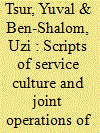| Srl | Item |
| 1 |
ID:
173205


|
|
|
|
|
| Summary/Abstract |
This paper argues that ethnic websites function as digital institutions in their community and foster group identity. In doing so, we add to the literature on institutions in two ways: first, we contribute to the concept of institutions by adding the concept of scripts that captures specific recurrent activities and patterns of interaction. The addition of scripts as a requirement of institutions solves the fuzziness problem since they compel us to specify the behaviour and clarifies how scripts fit ethnic websites. Second, we reveal how ethnic websites unite a wide range of functions – notably, as a means of communication, as a platform on which community members can address ethnic issues, as a device through which to build networks, and as a place from which to download materials in the ethnic community – thus fostering the identity of the ethnic group. We substantiate our argument with data from three ethnic groups in the Netherlands.
|
|
|
|
|
|
|
|
|
|
|
|
|
|
|
|
| 2 |
ID:
158150


|
|
|
|
|
| Summary/Abstract |
The Israel Defence Forces (IDF) face continuing challenges concerning joint operations of military services (e.g. air and ground forces) since, as in other militaries, the existence of separate service cultures creates operational difficulties. This article analyses in-depth interviews with commanders from the IDF’s air and ground forces. Its findings reinforce the ‘polarisation assumption’ of ‘us’ (the in-group) and ‘them’ (the out-group) that challenges successful cooperation, reflecting differences in the scripts of expectations and modes of action underlying perceptions of successful joint operations. These scripts create assumptions that are manifestations of a deep-rooted service culture. Such assumptions also have an effect on combat motivation as certain scenarios lead towards greater risk-taking in concrete operational situations. Cooperation between the Israeli Air Force and Special Forces is far more successful and smooth. The analysis of the success of joint operations can aid the armed forces in bridging differences and improving cooperation.
|
|
|
|
|
|
|
|
|
|
|
|
|
|
|
|